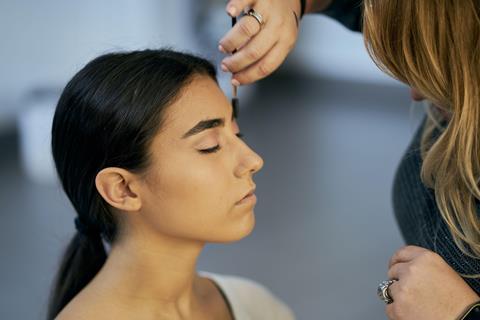Make-up artist and beauty brand ambassador Sarah Green explores how women can be shamed for wearing ‘too much’ make-up and poses a far more important question than if we should be wearing lippy.
As a makeup artist and beauty brand ambassador, I connect with women about everything beauty on the daily. First, a little background on me: I became a Christian in my late 20s and to be quite frank with you, it surprised me when I discovered that whether or not a Christian woman should or should not wear makeup was even up for debate. And don’t even get me started on what some have termed the ‘Jezebel factor’…

Opinions vary as widely as eyeshadow shades, but my research for this article revealed that most internet discussions seem to land on the idea that it is not how much makeup one wears that is the problem, but rather, the intent behind it. It has been proposed that there is a difference between merely hiding blemishes or coordinating your outfit with your lippie shade than with ‘over-sexualising’ your appearance in order to attract someone (in a lustful-carnal-desire kinda way). I also came across the argument that time spent on the female appearance ‘would have been better spent serving someone in need’. Let’s just leave that one there.
This thinking comes down to your personal relationship with God, to determine if you are wearing makeup with sinful intent, or not. They focus on the fact that God looks at the heart. Of course, God does look at our hearts. But I think rather than debate if this is ‘sinful’ and shame women for investing in themselves. Let’s encourage women to embrace their beauty and go on a journey of radical self-acceptance. If you are looking to get your heart right with God in this area - let’s start with us each learning to love ourselves as He loves us, including in our appearance, whether we are made up to the nines or not.
A friend of mine once told me that, as a teenager at a youth conference, she was applying makeup in the communal bathrooms, and some girls said to her: ‘God wants you to know that you are beautiful as you are.’ She felt like it was as if somehow her applying makeup meant that she didn’t know that. Perhaps it might be more helpful for us to not make any judgement on our fellow sisters and instead ask questions of ourselves of where we’re at in our own journey of embracing our beauty.
Perhaps it might be more helpful for us to not make any judgement on our fellow sisters and instead ask questions of ourselves of where we’re at in our own journey of embracing our beauty.
Many of us know the scripture, Psalm 139:14: ‘I praise you because I am fearfully and wonderfully made; your works are wonderful, I know that full well.’ But do you know that full well? I know for me, I spent years with a lot of insecurities around my appearance. I applied makeup in an attempt to fix a problem that it simply did not have the power to fix.
When I became a Christian, I went on a journey of learning to align myself with God’s love for me in every area of my life: including in how I look. A mentor challenged me to an activity that brought me a lot of breakthrough and I would like to invite you to try it too.
This is how it went: I stood in front of a mirror and apologised to myself for all the negative words that either I, or others had spoken about my appearance throughout the years. The school playground can be so cruel, as can the adult world - a quick look at magazines ripping apart the appearance of female celebrities shows us this. But sometimes our harshest critic can in fact be ourselves. Apologising to myself went a little something like this: ‘Sarah, I am so sorry that I called your skin ugly and your lips too small… I am so sorry for when people called you monobrow’ and so on and so on. One by one, I apologised for all that came to mind. It was quite an emotional experience.
I stood in front of a mirror and apologised to myself for all the negative words that either I, or others had spoken about my appearance throughout the years.
Next, I asked God to speak his truth over each of those places as He helped me to see me as He sees me. Then, I wrote a list of 20 things that I love about my appearance. Initially, 20 felt like ALOT! But, I found myself seeing my appearance in a new light, I guess you could say, in God’s light. Repentance means to change the way we think - and that I did. The truth is, loving yourself is partaking in God’s nature. Quirky aspects I had disliked, become endearing, rather than a ‘fault’. We always have a choice in what we partner with - will you agree with the voice of accusation or the voice of love? And you know what, the funniest thing happened… over the coming days I experienced compliments for the very things that I had disliked the most! It’s amazing how as we align our beliefs and words with God’s heart for us, things can change in our external experience too. (The tongue has the power of life and death, Proverbs 18:2).
In my day-job, my absolute favourite is when someone says to me ‘I just want to look like myself’. Whether that’s a bright red lip, smoky eyes or a bare-faced glow, you get to look like YOU. God fully accepts you and calls you ‘fearfully and wonderfully made’, the question is, will you accept you? I believe this to be the more important focus, not how much makeup you do or do not choose to wear.



























No comments yet